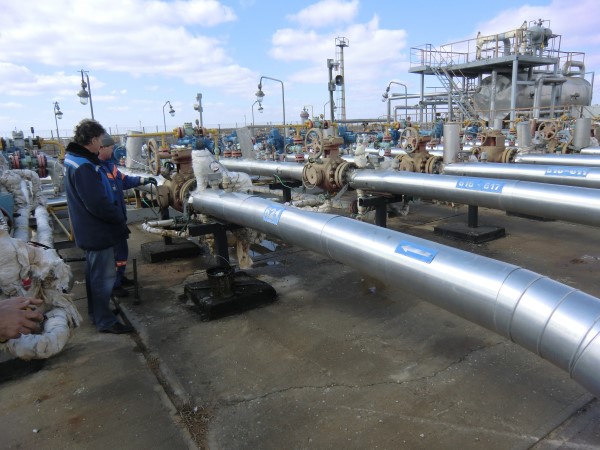Russia Ready to Re-Route Gas Flows if Hit by Sanctions
MOSCOW (Reuters) — Russia would be ready to re-route supplies to other markets should new Western sanctions target its energy sector, finance minister Anton Siluanov said on Wednesday.
Siluanov did not say how Moscow would divert its energy exports but said that Russia's foreign exchange reserves, National Wealth Fund and a budget surplus should shield its economy and banks from any possible sanctions hit.
The United States and its allies are considering new sanctions including against Russia's largest banks, economy and energy sector, with export controls possible, in the event that Moscow invades its neighbor Ukraine.
The Kremlin denies it has any such intention.
"Any export curbs would result in rising prices. And if such restrictions are to be applied then increases in prices should largely offset such curbs," Siluanov told reporters, as Russia's budget is highly dependent on energy sales both to European Union member states and Asia countries.
Inflation Impact
Russian imports account for 46% of Europe's solid fuels such as coal, 26% of its crude oil and 38% of the region's gas, Moody's research estimates, pointing out that even a brief cut in gas supply would further boost energy prices and inflation.
"An intensification of inflationary pressures could also increase pressure on the European Central Bank and other central banks to tighten monetary policy," Moody's said.
Eurozone inflation hit a record 5.1% in January, fuelling expectations that the ECB would have to end its bond buying scheme and raise interest rates for the first time since mid-2011.
Russia's options to re-route pipeline gas from Europe, which is supplied via routes not connected with Asian markets, are limited. But traders say Moscow may have greater flexibility with oil exports of which around a half, or some 2 million barrels per day (bpd), are delivered to Europe by the sea.
This month, Russia agreed to sell an additional 10 billion cubic metres of gas to China annually later this decade, equal to 5% of Moscow's current exports to Europe, and on par with the volumes Gazprom shipped to Beijing last year.
China consumes some 1.5 million bpd of Russian oil, or a fifth of total Moscow's exports, which are shipped both via pipelines and ports, to be increased by another 200,000 bpd thanks to the recent Rosneft ROSN.MM deal.
Claims of Motive
Separately on Wednesday, Russian Foreign Ministry spokeswoman Maria Zakharova accused the United States of whipping up tensions over Ukraine in an effort to block Nord Stream 2 and grab European gas market share.
At a weekly media briefing, Zakharova said: "The Nord Stream 2, the project they have been tried to slow down, prevent its appearance, stop its construction, then to make up a reason why it cannot be put in commission, and now they are trying to bring all weight to bear on us, having invented a Russian threat and using this pretense to impose more sanctions and to get more arguments for alarming Europeans by a prospect of not getting energy supplies from us."
Zakharova also claimed that Washington was trying to grab European gas market share from Russia, according to a report by Interfax news agency.
Related News
Related News

- Keystone Oil Pipeline Resumes Operations After Temporary Shutdown
- Biden Administration Buys Oil for Emergency Reserve Above Target Price
- Freeport LNG Plant Runs Near Zero Consumption for Fifth Day
- Enbridge to Invest $500 Million in Pipeline Assets, Including Expansion of 850-Mile Gray Oak Pipeline
- Williams Delays Louisiana Pipeline Project Amid Dispute with Competitor Energy Transfer
- Evacuation Technologies to Reduce Methane Releases During Pigging
- Editor’s Notebook: Nord Stream’s $20 Billion Question
- Enbridge Receives Approval to Begin Service on Louisiana Venice Gas Pipeline Project
- Mexico Seizes Air Liquide's Hydrogen Plant at Pemex Refinery
- Russian LNG Unfazed By U.S. Sanctions





Comments